This is topic Largest B&H Filmosound speaker I've seen... in forum 16mm Forum at 8mm Forum.
To visit this topic, use this URL:
https://8mmforum.film-tech.com/cgi-bin/ubb/ultimatebb.cgi?ubb=get_topic;f=5;t=001218
Posted by Travis Alsgard (Member # 4621) on January 06, 2015, 09:02 PM:
Looking for any information I can find associated with this model of speaker.
Stumbled across this on my travels and knew I had to own it. The driver is a Jensen H510 coaxial (15") and is obviously much larger than your standard fare. The previous owner got it from his father's estate but had no projector to accompany it.
Measurements are 33" high, 22" wide, 18" deep. Driver dates from 20th week of 1952.
Any info? Maybe you've at least seen one before? Thanks in advance all!
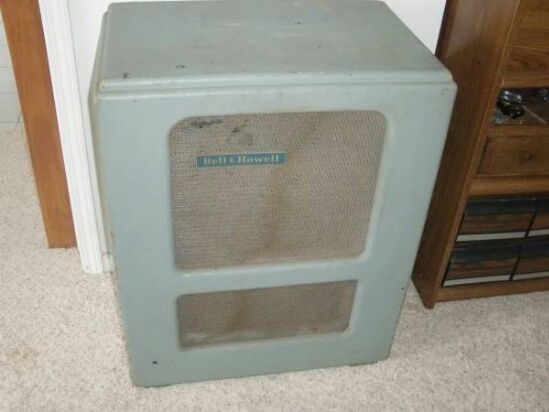
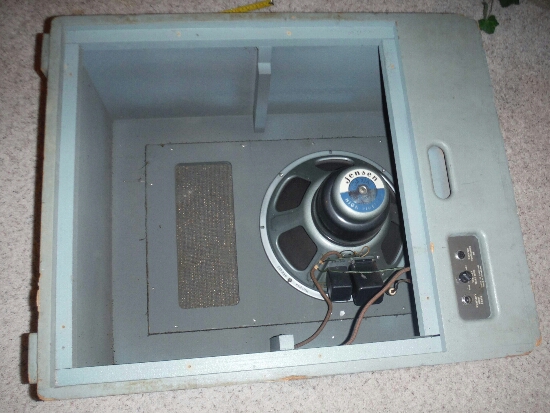
Posted by Maurice Leakey (Member # 916) on January 07, 2015, 02:25 AM:
What are the controls at the top? Is it a power amp?
Bell & Howell made a powered speaker for large locations. It weighed 48lbs.
Posted by Paul Mason (Member # 4015) on January 07, 2015, 04:51 AM:
It does look like a powered speaker with a matching transformer on the input of the massive driver. On the other hand the space for the amp is small and the visible sockets don't seem like mains supply sockets. Most likely an un-powered speaker capable of handling 30 to 50 watts with a bass reflex port to increase the efficiency.
Posted by Travis Alsgard (Member # 4621) on January 07, 2015, 11:40 AM:
It is non-powered. The input plate has 1/4" input and a tweeter attenuation knob. Also, the boxes mounted to the driver are the accompanying Jensen A110 crossover. This is a 2-way speaker with a compression driver through the center of the woofer voicecoil.
*edit* Just wanted to add that, coming from the vintage audio world, I know quite a bit about the speaker itself. My only concern was about removing it from the cabinet and putting it in something more suitable (much larger) if it's a rare piece of B&H history.
[ January 08, 2015, 12:21 AM: Message edited by: Travis Alsgard ]
Posted by Paul Mason (Member # 4015) on January 08, 2015, 02:54 AM:
I think it is a rare bell & Howell cabinet but the Jensen driver may not be the original. The frequency response of optical 16mm tracks in 1952 would be only be 70 to 7000 Hz at best so 2 way speakers are very unusual outside permanent cinemas.
Posted by Maurice Leakey (Member # 916) on January 08, 2015, 03:27 AM:
I have my doubts that this is a genuine Bell & Howell accessory.
1) The name plate is in an unusual position for a Bell & Howell item, and looks stuck on.
2) Why would Bell & Howell make this when they already produced powered speakers?
Posted by Charles Peich (Member # 3791) on January 08, 2015, 02:33 PM:
Greetings Travis!
The Bell and Howell speaker you have is called a "Little Orchestricon". This is one in the line of auditorium speakers that B&H offered.
I have seen this speaker listed in a post war 1946 B&H price list, and as late in a 1954 price list and sales catalog.
I think the Little Orchestricon speaker may have been introduced when B&H 1st introduced the Filmoarc Projector. It must have gone through some improvements or changes and evolved into the speaker you have.
These 2 pictures are from a 1954 sales catalog that has both 16mm and 8mm cameras and projectors......
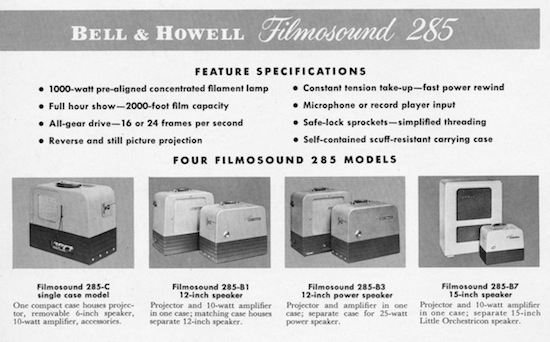
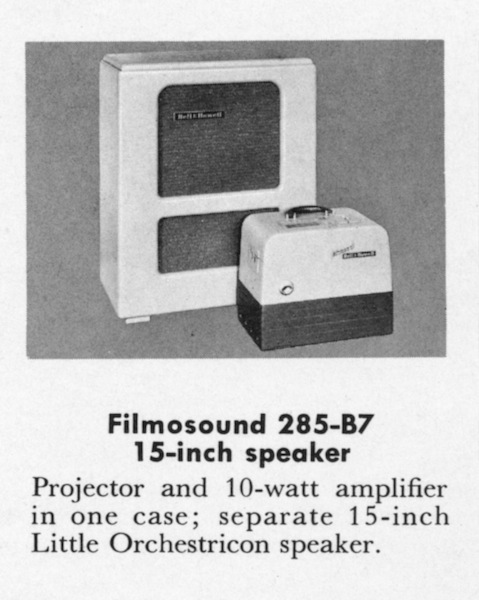
The price list lists it with the powered speakers that have a 25 watt amp and 12 inch speaker. The Orchestricon speaker is listed at 15 inches.
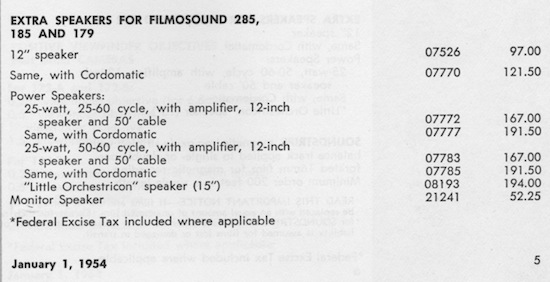
This link takes you to a brochure for the early Filmoarc projector. Not the best quality, but the last page of the pdf describes the "Orchestricon" speaker used with the Filmoarc. (enlarge the page, easier to read)
http://www.acofs.org.au/part_4_files/Bell%20&%20Howell/User-Filmoarc.PDF
There's not much on the net about the Little Orchestricon speaker. Maybe separate sales brochures for the B&H line of 16mm sound projectors have more information.
Hope this helps!
Posted by Maurice Leakey (Member # 916) on January 08, 2015, 03:09 PM:
I stand corrected.
In the UK the Bell & Howell 609 was a carbon arc projector, very similar to the illustrated projector. It was based on the model 601 picture/sound head.
The arc was 30 amps DC and burnt for nearly one hour on the one carbon trim. It was on a roll away stand with the separate amplifier beneath it, the rectifier stood beneath the amp. The 609 had a 25 watt amplifier and a built-in monitor speaker with change-over unit. It was supplied with two 12" speakers. The price in 1954 was £650.
I recall seeing two of these in use in 1965 at Butlins Holiday Camp at Pwllheli in North Wales. The screen was square, owners of the earlier Bell & Howells will recall that they did not have optical framing, therefore the picture moved either up or down when the framing knob was turned. It was obviously impossible to re-tilt a heavy projector so the screen allowed for the up and down movement of the picture as necessary.
It certainly was a distinct improvement when the 641/642/643/644 came out in the early sixties with their full optical framing.
Posted by Mark Todd (Member # 96) on January 08, 2015, 04:51 PM:
How does a carbon arc lamp actually work then people, is it burning what creastes the light or is there a chemical reaction etc or something ?
Best Mark.
Posted by Travis Alsgard (Member # 4621) on January 08, 2015, 11:26 PM:
Thank you Charles!
Exactly the information I was looking for. I knew a few catalog scans had to exist somewhere, it was just finding them that was causing all the trouble.
The driver alone is sought after to the vintage HiFi crowd (myself included) but seeing as this was a factory piece with very little information available, I'll definitely be keeping it as a complete unit. I suppose now would be the time to further pry on the previous owner to see if the projector may still be around.
Very much appreciated! I now have a bit of history to share about the unit if the opportunity presents itself. Thank you again.
Posted by Maurice Leakey (Member # 916) on January 09, 2015, 02:41 AM:
A carbon arc.
There are two carbons. A positive and a negative. The DC current flows from the negative to the positive. The carbon vapourises at its high temperature. This vapour is highly luminous.
The carbons burn away at a constant rate, an electric motor ensures that the gap between the two is maintained at a constant distance. The arc.
A concave mirror focuses the light onto the film gate.
Posted by Paul Mason (Member # 4015) on January 09, 2015, 02:41 AM:
Like Maurice I stand corrected. I'm glad it's a genuine B & H accessory. Definitely rare in the UK. It would have been very efficient and ideal for the 10 watt amplifier.
Visit www.film-tech.com for free equipment manual downloads. Copyright 2003-2019 Film-Tech Cinema Systems LLC

UBB.classicTM
6.3.1.2




